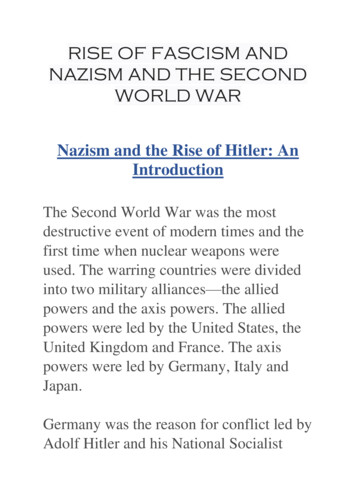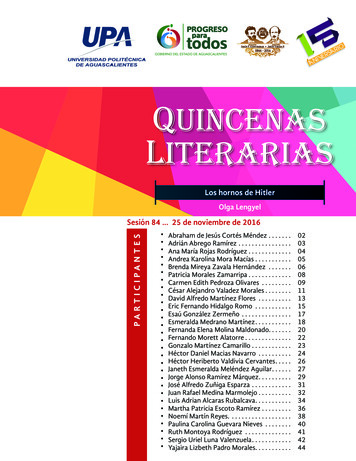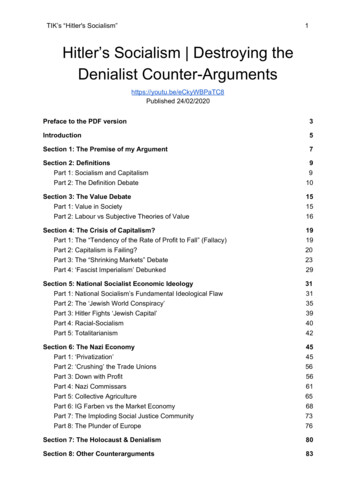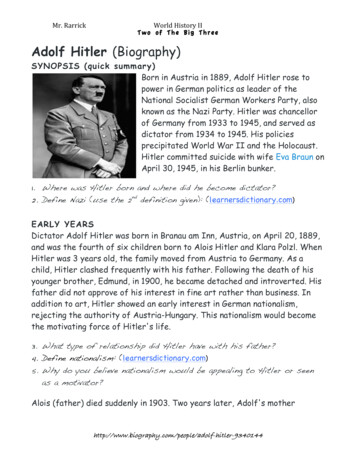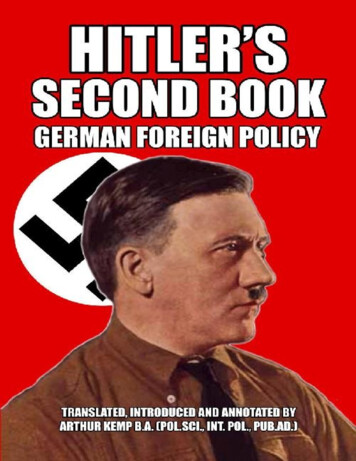
Transcription
HITLER’S SECOND BOOK:GERMAN FOREIGN POLICYADOLF HITLERThe Full Text of the Unpublished 1928 BookTranslated, Introduced and Annotated byArthur Kemp B.A. (Intl. Pol., Pol. Sci., Pub.Ad.)Ostara Publications
Hitler’s Second Book: German Foreign PolicyBy Adolf HitlerTranslated, Introduced and Annotated by Arthur KempOstara Publications 2104http://ostarapublications.com
CONTENTSIntroduction: The Story of the ManuscriptForewordThe South Tyrol question—Blindness of thenationalists—Italy, not France, the desirable allybourgeoisChapter IHistory is the story of peoples’ struggles for existence—Peaceand war as means of waging the struggle—Neither should bethe sole means—Too much war kills off the elite—Too muchpeace leads to submissiveness and emigration.Chapter IITerritorial conquest is necessary for a people’s security andhealthy growth—Morality of conquest: no one owns any part ofthe Earth—Birth control eugenically unsound—Spartan exposurelogical—Emigration sacrifices best elements—Increase inproductivity of no help competitively—Export trade vanishing asother nations modernize—Necessity of strife.Chapter IIIWeapons on hand no gauge of national strength—National willthe decisive factor—Old German army as source of people’s willand discipline—National-Socialist mission to revitalize nationalwill—Blood and folk values superior to internationalism—Leadership superior to mass democracyChapter IVMust learn from the past—Must forge the instruments forchange to a fruitful German foreign policy—Correct ideasvalueless unless translated into action—The Pan-German
League—Necessity of taking risks—Policies must be carried outwith vigor even if total success not guaranteed—Breaking thecircle of enemies of Germany.Chapter VNSDAP is socialist and nationalist—Bourgeois nationalists aim torestore Germany’s pre-war frontiers—NSDAP foreign policy aimsat territorial expansion, and bringing Germans under Germansovereignty—Folkdom as basis of policy.Chapter VINeed of alliances to achieve German aims—German bordersunsatisfactory both economically and militarilyChapter VIILack of national goals after Bismarck—Democracy responsiblefor bungling—Goal should have been acquisition of Germanareas of Europe—Worthlessness of Hapsburg Empire—Germanpart of South Tyrol would be German territory today if territorialpolicy had been followed—Catholic Center and Jewish SocialDemocrats blocked territorial policies—Worthlessness toGermany of Triple Alliance—Destruction of Germanism inAustria-Hungary—Unwise failure to support Italy in Tripoli—Italycannot oppose England—Austria sole profiteer from TripleAlliance—German colonial policy a blunder, led to conflict withEngland—Western Russia the proper area for Germanexpansion.Chapter VIIILack of German war aims in World War—Aim should have beenterritorial, prize lands for fighter-farmers—Decline of “old” army—Deficiencies of today’s mercenary army—Bismarck andpreventive war—Germany’s two-power land standard—Americahas upset balance of power—Reichswehr turned into domestic
police force—Need for nationalist spirit—Border-restorationpolicy will lead to coalition of victor nations—Beer-hall patriots’empty talk of “national honor”.Chapter IXGermany today powerless to defend honor or borders—Increased production no solution—England won’t toleratemerchant trade competition—Emigration no solution—Americanracial immigration policies—Pan-Europeanism no solution, leadsto loss of folk-values—American values based on dominantkindred groups.Chapter XNeutrality as policy means some other nation wins—Desirabilityof action— Worthlessness of League of Nations—Americangreatness the result of intervention in World War—Italy justifiedin deserting Triple Alliance.Chapter XIFranco-Russian and Anglo-French alliances surround Germany—Militarily indefensible German borders—Vulnerability of Germancities to attack from the air—Russian alliance would becatastrophic—France always the enemy—Soviet Russian goal isJewish communist poisoning of Germany—Jews have destroyedRussian elite—Russo-German alliance would mean invasion ofGermany from West—Russian alliance would block Germanexpansion by conquest of Russian territory—Jews dominateRussia, but could in future be displaced by “NationalBolshevism.”Chapter XIIEight principles.Chapter XIII
Inaction dangerous—Peaceful economic expansion no solution—Border restoration policy futile—Necessity of Völkisch territorialpolicy.Chapter XIVEnglish race-values—Colonies—England doesn’t opposecontinental power, but does oppose trade and naval rivals—Wilhelm II squandered resources on German fleet—Could havehad understanding with England—England threatened by Franceon continent, America on the seas, and Russia in Asia—Jewry inEngland a threat to an Anglo-German alliance.Chapter XVItaly promising as German ally—Mussolini and race-values—Must forget Italy as enemy in World War—Italy natural enemyof France, natural ally of England—Germany should also haveabandoned Austria-Hungary—Blindness of bourgeoisnationalists who oppose Italy and Mussolini—South Tyrol—Jewsuse Tyrol to set Italy and Germany at odds—Germans in Alsace,Poland, etc., just as important as those in South Tyrol—Adviceto Mussolini—The true villains who bear guilt for the South Tyrol—US Secret Service Head Reveals Why America Entered theWar.Chapter XVIItaly as an ally of Germany—England, and perhaps Hungary andSpain, as allies of Germany—Jewry responsible for Germandisaster in World War—An overview of Jewish interventionisttactics in International Relations.Appendix 1: How America Entered the War:Article originally meant to be inserted inChapter XV
Introduction: The Story of the ManuscriptDedicated in 1928 to Max Annan, Hitler’s personal friend andhead of the NSDAP’s publishing house, the Franz EherNachfolger GmbH (the “Eher-Verlag”), the unedited and draftmanuscript, provisionally titled “Deutsche Aussenpolitik” butlater more commonly known as Hitler’s “Second Book,” wasnever published in Hitler’s lifetime.Various reasons have been put forward as to why themanuscript was never published. It is often claimed that poorsales of Mein Kampf, Hitler’s first book, were the reason. Thefacts of the situation do not support this claim. Hitler wasalready independently wealthy from sales of his first book, tothe point where he never accepted a salary from the state forthe thirteen years he spent as chancellor.The most likely reason for the non-publication of this, hissecond book, is simply time. The manuscript was completed in1928, and in the following four years, Hitler and the NationalSocialist party took part in no less than five major nationalelections (1928, 1930, July 1932, November 1932, and March1933).Between this exertion, his hectic speaking schedule andday-to-day politicking, it is clear that Hitler and Max Annansimply never had the time to edit the manuscript properly, andcorrect any spelling or grammatical errors. The book was alsoprepared at a time in German history when the question ofSouth Tyrol was specifically in the news, and it was also anattempt to win adherents to the NSDAP.As a result, when there would have been time to finishediting the book, Hitler was already in office—and thus therewas simply no need, financially or politically, for another bookpredicting what the new Chancellor was already doing.Thus the manuscript—of which there were two copies—
lay locked up—one in Hitler’s safe at his home in theObersalzburg, and the other in the safe of the Eher Verlag inMunich.Just prior to the end of the war, by Hitler’s order, the SSgarrison at the Obersalzburg burned all his papers—and hishouse.At the time, no one seemed to know what had happenedto the copy in the Eher Verlag’s safe. The matter was forgottenin the immediate aftermath of the war, even though Hitler didrefer to the manuscript at least once.On February 17, 1942, he remarked during a discussionon Japan and the Jews, that “In 1925 I wrote in Mein Kampf(and also in an unpublished work) that world Jewry saw inJapan an opponent beyond its reach” (Adolf Hitler, February 17,1942, as quoted in Hitler’s Table Talk, February 17, 1942,midday).The story of how the manuscript was found wasdetailed in the October 1962 edition of The American Archivist,published by the Society of American Archivists, Volume 25,Number 4, pages 469–472).According to that journal, in the winter of 1950–51 twoenlisted men, military intelligence linguists, were engaged inunpacking crated German records that had been held in storagepending analysis.One of these men later recalled that they had seen thena typescript that an intelligence team had picked up from theEher Verlag.Although this document was labeled “an allegedunpublished work by Adolf Hitler,” they assumed it to be “a draftcopy of Mein Kampf” and had therefore tentatively identified itas a “Mein Kampf manuscript.”
It was put in a safe containing other miscellaneous itemsthat could not be assigned to an established series and not lefton any of the open shelves—meaning that it was buried evendeeper in the paperwork records.In July 1958, a German historian named Erich Lauer,director of the Arbeitskreis fur Kriegsgeschichte, wrote to theUS Army Archives, asking for information about an unpublishedbook by Adolf Hitler with the title Deutsche Aussenpolitik(“German Foreign Policy”).Lauer had information that the manuscript had beenacquired from Josef Berg, business manager of the Eher Verlag,by Captain Paul M. Leake, Signal Corps, AUS, the officer incharge of the intelligence team that visited Berg’s firm in April1945, when Munich was occupied by the US Seventh Army.Richard Bauer, former enlisted linguist in the GermanMilitary Documents Section and, in 1958, in charge of thereference service on captured documents, proceeded to make acareful examination of the paper, which he knew to be in thespecial document safe.He soon realized that the document in question wasmislabeled in that it was not a draft of Mein Kampf. Although ithad no title or title page, its 324 pages, typed double-spaced inpurple ink, did deal with German foreign policy, and the styleand phraseology appeared to be Hitler’s.Since the documents in the safe, as indeed many seriesof captured records, had not been reached in the progressiveprogram of security review and downgrading, the manuscriptstill retained its confidential classification.Pending the security review and determination of policywith respect to handling the document, Lauer was merelyinformed that no such document was among the unclassifiedGerman records in US custody. At the same time, the document
was immediately given a number, EAP 105/40, in the series ofmiscellaneous documents arranged according to the GermanArmy Unified Documents System (EAP); and it was submitted tothe Army Assistant Chief of Staff, Intelligence, with a requestfor its removal from the confidential classification.Removal of the classification was promptly authorizedand in August 1958, the document was submitted informally tothe Historical Division, Department of State. By 1959 it hadbeen microfilmed and released into the public domain.German Jewish historian Gerhard Weinberg then quitefalsely claimed that he had discovered the manuscript(“Revealed: the amazing story behind Hitler’s second book”, TheTelegraph, London, Sept. 25, 2003).In reality, Weinberg had only been told about themanuscript’s existence by Bauer, who should really be creditedwith finding the book.After obtaining a copy of the manuscript from Bauer,Weinberg then produced a highly-edited (actually a censored)version of the book in German, titled Hitlers Zweites Buck, einDokument aus dem Jahr 1928 (“Hitler’s Second Book, aDocument from the Year 1928”), published by the Institut fürZeitgeschichte (“Institute of Contemporary History”) in Munich.The Institut für Zeitgeschichte was, and still is, a historicalresearch center set up by the post-war West Germangovernment in 1947, at the insistence of the Allied occupyingpowers, to present anti-Hitler propaganda in Germany.Subsequent to the edited version appearing in German,an unknown “pirate” edition of Weinberg’s version appeared inEnglish.This first translation was pitifully poor, and in somesections, completely incomprehensible. This was probablyaggravated by the fact that the original manuscript was also
unedited. Finally, another English edition appeared, of betterquality, but that remained only a translation of the “edited”Weinberg version.The work you now hold in your hands is the very firstcomplete and accurate translation done in which the basic ideasare put down in readable and everyday English. All of the ideas,thoughts and concepts have been faithfully captured, analyzedand set down in the manner in which they would ultimatelyhave appeared, had it ever been officially printed.Apart from the foreword, the original manuscript containsno chapter titles—possibly they were to be added later. Thisedition has kept to that restriction, but essential summaries ofchapter contents have been added to the table of contents tohelp guide the reader.Arthur KempJune 2014
ForewordIn August, 1925, on the occasion of the writing of the secondvolume (Mein Kampf)[1], I formulated the fundamental ideas ofa National Socialist foreign policy, in the brief time afforded bythe circumstances. Within the framework of that book I dealtespecially with the question of the South Tyrol,[2] which gaverise to attacks against the movement as violent as they weregroundless.In 1926 I found myself forced to have this part of thesecond volume published as a special edition. I did not believethat by so doing I would convert those opponents who, in thehue and cry over the South Tyrol, saw primarily a welcomemeans for the struggle against the hated National Socialistmovement.Such people cannot be taught better because thequestion of truth or error, right or wrong, plays absolutely nopart for them. As soon as an issue seems suitable forexploitation, partly for political party purposes, partly even fortheir highly personal interests, the truthfulness or rightness ofthe matter at hand is altogether irrelevant.This is all the more the case if they can thereby inflictdamage on the cause of the general awakening of our people.For the men responsible for the destruction of Germany,dating from the time of the collapse,[3] are her present rulers,and their attitude of that time has not changed in any respectup to now. Just as at that time they cold-heartedly sacrificedGermany for the sake of doctrinaire party views or for their ownselfish advantage, today they likewise vent their hatred againstanyone who contradicts their interests, even though he mayhave, a thousand fold, all the grounds for a German resurgenceon his side. Even more. As soon as they believe the revival ofour people, represented by a certain name, can be seen, they
usually take a position against everything that could emanatefrom such a name.The most useful proposals, indeed the most patentlycorrect suggestions, are boycotted simply because theirspokesman, as a name, seems to be linked to general ideaswhich they presume they must combat on the basis of theirpolitical party and personal views. To want to convert suchpeople is impossible.Hence in 1926 when my brochure on the South Tyrol wasprinted, I naturally gave not a second’s thought to the idea thatI could make an impression on those who, in consequence oftheir general philosophical and political attitude, alreadyregarded me as their most vehement opponent.At that time I did entertain the hope that at least some ofthem, who were not at the outset malicious opponents of ourNational Socialist foreign policy, would first examine our view inthis field and judge it afterward.Without a doubt this has also happened in many cases.Today I can point out with satisfaction that a great number ofmen, even among those in public political life, have revisedtheir former attitude with respect to German foreign policy.Even when they believed they could not side with ourstandpoint in particulars, they nevertheless recognized thehonorable intentions that guide us here.During the last two years, of course, it has becomeclearer to me that my writing of that time was in fact structuredon general National Socialist insights as a premise. It alsobecame clearer that many do not follow us, less out of ill-willthan because of a certain inability. At that time, within thenarrowly drawn limits, it was not possible to give a realfundamental proof of the soundness of our National Socialistconception of foreign policy.
Today I feel compelled to make up for this. For not onlyhave the attacks of the enemy been intensified in the last fewyears but through them the great camp of the indifferent hasalso been mobilized to a certain degree.The agitation that has been systematically conductedagainst Italy for the past five years threatens slowly to bearfruit: resulting in the possible death and destruction of the lasthopes of a German resurgence.Thus, as has often happened in other matters, theNational Socialist movement in its foreign policy position standscompletely alone and isolated within the community of theGerman people and its political life.The attacks of the general enemies of our people andfatherland are joined inside the country by the proverbialstupidity and ineptitude of the bourgeois national parties, theindolence of the broad masses, and by cowardice, as aparticularly powerful ally: the cowardice that we can observetoday among those who by their very nature are incapable ofputting up any resistance to the Marxist plague, and who, forthis reason, consider themselves downright lucky to bring theirvoices to the attention of public opinion in a matter which is lessdangerous than the struggle against Marxism and whichnevertheless looks and sounds like something similar to it.For when they raise their clamor over the South Tyroltoday, they seem to serve the interests of the national struggle,just as, conversely, they come as close as they can to standingaside from a real struggle against the worst internal enemies ofthe German nation. These patriotic, national, and also in partVölkisch[4] champions, however, find it considerably easier tolaunch their war cry against Italy in Vienna or Munich underbenevolent support and in union with Marxist betrayers of theirpeople and country, rather than fight an earnest war againstthese very elements.
Just as so much nowadays has become appearance, thewhole national pretense by these people has for a long timebeen only an outward show which, to be sure, gratifies them,and which a great part of our people does not see through.Against this powerful coalition, which from the most variedpoints of view is seeking to make the question of the SouthTyrol the pivot of German foreign policy, the National Socialistmovement fights by unswervingly advocating an alliance withItaly against the ruling Francophile tendency.Thereby the movement, in contradistinction to the wholeof public opinion in Germany, emphatically points out that theSouth Tyrol neither can nor should be an obstacle to this policy.This view is the cause of our present isolation in the sphere offoreign policy and of the attacks against us. Later, to be sure, itwill ultimately be the cause of the resurgence of the Germannation.I write this book in order to substantiate this firmly heldconception in detail and to make it understandable. The lessimportance I attach to being understood by the enemies of theGerman people, the more I feel the duty of exerting myself topresent and to make comprehensible the fundamental NationalSocialist idea of a real German foreign policy to the nationalminded elements of our people as such, who are only badlyinformed or badly led.I know that after a sincere verification of the conceptionpresented here, many of them will give up their previousassertions and find their way into the ranks of the NationalSocialist freedom movement of the German nation. They willthus strengthen that force which one day will bring about thefinal settlement with those who cannot be taught because theirthought and action are determined not by the happiness of theirpeople, but by the interests of their party or of their ownperson.Adolf Hitler May, 1928.
Chapter IPolitics is history in the making. History itself is the presentationof that course of a people’s struggle for existence. I deliberatelyuse this phrase “struggle for existence” here because in truththat struggle for daily bread, equally in peace and war, is aneternal battle against thousands upon thousands of resistancesjust as life itself is an eternal struggle against death.For men know as little why they live does any othercreature of the world. Only life is filled with the longing topreserve itself. The most primitive creature knows only theinstinct of the self-preservation of its own “I,” in creaturesstanding higher in the scale it is transferred to wife and child,and in those standing still higher to the entire species.While, apparently, man often surrenders his own instinctof self-preservation for the sake of the species, in truth henevertheless serves it to the highest degree. For not seldom thepreservation of the life of a whole people, and with this of theindividual, lies only in this renunciation by the individual. Hencethe sudden courage of a mother in the defense of her young,and the heroism of a man in the defense of his people.The two powerful life-instincts of hunger and lovecorrespond to the greatness of the instinct for self-preservation.While the fulfillment of eternal hunger guarantees selfpreservation, the satisfaction of love assures the continuance ofthe race.In truth these two drives are the rulers of life. And eventhough the fleshless aesthete may lodge a thousand protestsagainst such an assertion, the fact of his own existence isalready a refutation of his protest. Nothing that is made of fleshand blood can escape the laws which determined its coming intobeing. As soon as the human mind believes itself to be superiorto them, it destroys that real substance which is the bearer ofthe mind.
What, however, applies to individual man also applies tonations. A nation is only a multitude of more or less similarindividual beings. Its strength lies in the value of the individualbeings forming it as such, and in the character and the extentof the sameness of it these values.The same laws which determine the life of the individual,and to which he is subject, are therefore also valid for thepeople. Self-preservation and continuance are the great urgesunderlying all action, as long as such a body can still claim to behealthy.Therefore, even the consequences of these general lawsof life will be similar among peoples, as they are amongindividuals.If for every creature on this earth the instinct of selfpreservation, in its twin goals of self-maintenance andcontinuance, exhibits the most elementary power, neverthelessthe possibility of satisfaction is limited, so the logicalconsequence of this is a struggle in all its forms for thepossibility of maintaining this life, that is the satisfaction of theinstinct for self-preservation.Countless are the species of all the earth’s organisms,unlimited at any moment in individuals is their instinct for selfpreservation as well as the longing for continuance, yet thespace in which the whole life process takes place is limited. Thestruggle for existence and continuance in life waged by billionsupon billions of organisms takes place on the surface of anexactly measured sphere. The compulsion to engage in thestruggle for existence lies in the limitation of the living space;but in the life-struggle for this living space lies also the basis forevolution.In the times before man, world history was primarily apresentation of geological events: the struggle of natural forceswith one another, the creation of an inhabitable surface on this
planet, the separation of water from land, the formation ofmountains, of plains, and of the seas. This is the world historyof this time.Later, with the emergence of organic life, man’s interestconcentrated on the process of becoming and the passing awayof its thousand fold forms.And only very late did man finally become visible tohimself, and thus by the concept of world history he began tounderstand first and foremost only the history of his ownbecoming, that is the presentation of his own evolution. Thisevolution is characterized by an eternal struggle of men againstbeasts and against men themselves. Form the invisibleconfusion of the organism there finally emerged formations,clans, tribes, peoples, states.The description of their origins and their passing away isbut the representation of an eternal struggle for existence.If however politics is history in the making and historyitself the presentation of the struggle of men and nations forself-preservation and continuance, then politics is in truth theexecution of a nation’s struggle for existence. But thereforepolitics is not only the struggle of a nation for its existence assuch; for us men it is rather the art of carrying out thisstruggle.Since history as the representation of the hithertoexisting struggle for the existence of nations is at the sametime the petrified representation of politics prevailing at a givenmoment, it is the most suitable teacher for our own politicalactivity.If the highest task of politics is the preservation and thecontinuance of the life of a people, then this life is the eternalstake with which it fights, for which and over which this struggleis decided. Hence its task is the preservation of that substance
made of flesh and blood. Its success is the making possible ofthis preservation. Its failure is the destruction that is the loss ofthis substance.Consequently, politics is always the leader of the strugglefor existence, the guide of the same, its organizer, and itsefficacy will, regardless of how man formally designates it, carrywith it the decision as to the life or death of a people.It is necessary to keep this clearly in view because withthis the two concepts—policies of peace or war—immediatelysink into nothingness. Since the stake over which politicswrestles is always life itself, the result of failure or success willlikewise be the same, regardless of the means with whichpolitics attempts to carry out the struggle for the preservationof the life of a people.A peace policy that fails leads just as directly to thedestruction of a people, that is to the extinction of its substanceof flesh and blood, as a war policy that miscarries.In the one case just as in the other, the plundering of theprerequisites of life is the cause of the dying out of a people.For nations have not become extinct on battlefields, lost battlesrather have deprived them of the means for the preservation oflife, or better expressed, have led to such a deprivation, or werenot able to prevent it.Indeed the losses which arise directly from a war are inno way proportionate to the losses deriving from a people’s badand unhealthy life as such.Silent hunger and evil vices in ten years kill more peoplethan war could finish off in a thousand years. The cruelest war,however, is precisely the one which appears to be most peacefulto present-day humanity, namely the peaceful economic war.In its ultimate consequences this very war leads tosacrifices in contrast to which even those of the World War
shrink to nothing. For this war affects not only the living butgrips above all those who are about to be born.Whereas war at most kills off a fragment of the present,economic warfare murders the future.A single year of birth control in Europe kills more peoplethan all those who fell in battle, from the time of the FrenchRevolution up to our day, in all the wars of Europe, including theWorld War.But this is the consequence of a peaceful economic policywhich has overpopulated Europe without preserving thepossibility of a further healthy development for a number ofnations.In general, the following should also be stated: As soonas a people forgets that the task of politics is to preserve its lifewith all means and according to all possibilities, and insteadaims to subject politics to a definite mode of action, it destroysthe inner meaning of the art of leading a people in its fatefulstruggle for freedom and bread.A policy which is fundamentally bellicose can keep apeople removed from numerous vices and pathologicalsymptoms, but it cannot prevent a change of the inner values inthe course of many centuries.If it becomes a permanent phenomenon war contains aninner danger in itself, which stands out all the more clearly themore dissimilar are the fundamental racial values whichconstitute a nation.This already applied to all the known states of antiquityand applies especially today to all European states. The natureof war entails that, through a thousand fold individualprocesses, it leads to a racial selection within a people, whichsignifies a preferential destruction of its best elements.
The call to courage and bravery finds its response incountless individual reactions, in that the best and mostvaluable racial elements again and again voluntarily comeforward for special tasks, or they are systematically cultivatedthrough the organizational method of special formations.Military leadership of all times has always beendominated by the idea of forming special legions, chosen elitetroops for guard regimental and assault battalions.Persian palace guards, Alexandrian elite troops, Romanlegions of Praetorians, lost troops of Landsknechte,[5] theguard regiments of Napoleon and Frederick the Great, theassault battalions, submarine crews and flying corps of theWorld War owed their origin to the same idea and necessity ofseeking out of a great multitude of men those with the highestaptitude for the performance of correspondingly high tasks andbringing them together into s
HITLER'S SECOND BOOK: GERMAN FOREIGN POLICY ADOLF HITLER The Full Text of the Unpublished 1928 Book Translated, Introduced and Annotated by Arthur Kemp B.A. (Intl. Pol., Pol. Sci., Pub.


